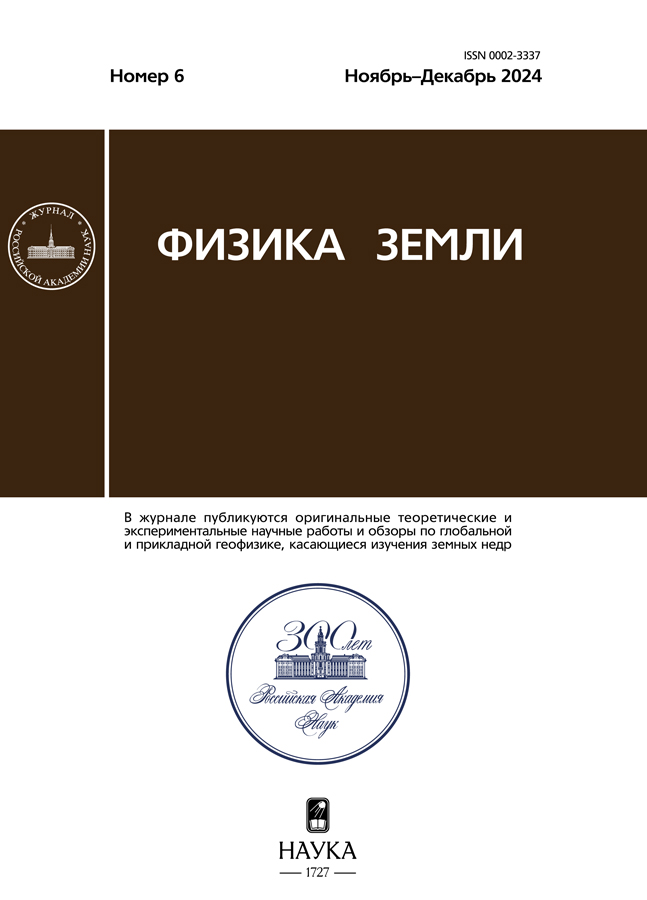Asymptotics of Branching of Families of the Least Stable Magnetic Modes of the Bloch Type
- Autores: Zheligovsky V.A.1
-
Afiliações:
- Institute of Earthquake Prediction Theory and Mathematical Geophysics of the Russian Academy of Sciences
- Edição: Nº 6 (2024)
- Páginas: 178-186
- Seção: Articles
- URL: https://journals.eco-vector.com/0002-3337/article/view/678327
- DOI: https://doi.org/10.31857/S0002333724060122
- EDN: https://elibrary.ru/RFUNWL
- ID: 678327
Citar
Texto integral
Resumo
A Bloch mode is a vector field that is the product of a three-dimensional field of the flow periodicity, and a Fourier harmonic for an arbitrary wave vector q. Previous computations showed that the modes whose growth rates are maximum over all vectors q are arranged in families, which are smoothly parameterised by the molecular magnetic diffusivity. In some families, the growth rates assume the maximum for the so-called half-integer q, whose all components are integer or half-integer, and q is constant for the entire family. From such families, other families can stem, in which the optimal q of the modes varies smoothly over a family. For the modes comprising such offshoot families, the associated eigenvalues of the magnetic induction operator and the optimal q, we construct here asymptotic expansions in power series in the parameter where is the magnetic diffusivity for which the branching occurs. In this paper, we assume that the modes in the family undergoing the branching involve a constant non-zero half-integer wave vector q. The asymptotic expansions differ significantly from the similar expansions that we constructed earlier for the branching from a family of short-scale (i.e., for neutral (associated with a zero eigenvalue of the magnetic induction operator) magnetic modes generated by a parity-invariant flow.
Texto integral
Sobre autores
V. Zheligovsky
Institute of Earthquake Prediction Theory and Mathematical Geophysics of the Russian Academy of Sciences
Autor responsável pela correspondência
Email: vlad@mitp.ru
Rússia, Moscow, 117997
Bibliografia
- Арнольд В.И., Зельдович Я.Б., Рузмайкин А.А., Соколов Д.Д. Стационарное магнитное поле в периодическом потоке // Докл. АН СССР. 1982. Т. 266. С. 1357–1351.
- Желиговский В.А. Математическая теория устойчивости магнитогидродинамических режимов к длинномасштабным возмущениям. М.: Красанд–УРСС. 2010. 352 c.
- Желиговский В.А., Чертовских Р.А. О кинематической генерации магнитных мод блоховского типа // Физика Земли. 2020. № 1. C. 118–132. (Перевод на англ.: Zheligovsky V.A., Chertovskih R.A. On kinematic generation of the magnetic modes of Bloch type // Izvestiya, Physics of the Solid Earth. 2020. V. 56. P. 103–116.)
- Краузе Ф., Рэдлер К.-Х. Магнитная гидродинамика средних полей и теория динамо. М.: Мир. 1984. 320 с. (Пер. с англ.: Krause F., Rädler K.-H. Mean-field magnetohydrodynamics and dynamo theory. Berlin: Academic-Verlag. 1980. 271 p.)
- Bloch F. Über die Quantenmechanik der Elektronen in Kristallgittern. Zeitschrift für Physik A // Hadrons and Nuclei. 1929. V. 52. P. 555–600.
- Chertovskih R., Zheligovsky V. Linear perturbations of the Bloch type of space-periodic magnetohydrodynamic steady states. I. Mathematical preliminaries // Russian J. of Earth Sciences. 2023a. V. 23. ES3001. doi: 10.2205/2023es000834
- Chertovskih R., Zheligovsky V. Linear perturbations of the Bloch type of space-periodic magnetohydrodynamic steady states. II. Numerical results // Russian J. of Earth Sciences. 2023b. V. 23. ES4004. doi: 10.2205/2023es000838
- Chertovskih R., Zheligovsky V. Linear perturbations of the Bloch type of space-periodic magnetohydrodynamic steady states. III. Asymptotics of branching // Russian J. of Earth Sciences. 2023c. V. 23. ES5004. doi: 10.2205/2023es000841
- Rädler K.-H. Mean-field dynamo theory: early ideas and today’s problems. Magnetohydrodynamics. Historical evolution and trends. Fluid mechanics and its applications. V. 80 / Molokov S., Moreau R., Moffatt K. (eds.). Springer. 2007. P. 55–72.
- Zheligovsky V.A. Large-scale perturbations of magnetohydrodynamic regimes: linear and weakly nonlinear stability theory. Lecture Notes in Physics. V. 829. Heidelberg: Springer-Verlag. 2011. 330 p.
Arquivos suplementares









